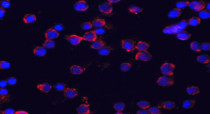ARG54329
anti-CD261 / TRAIL R1 antibody
anti-CD261 / TRAIL R1 antibody for ICC/IF,Western blot and Human,Mouse,Rat
Cell Biology and Cellular Response antibody; Cell Death antibody; Immune System antibody
Overview
| Product Description | Rabbit Polyclonal antibody recognizes CD261 / TRAIL R1 |
|---|---|
| Tested Reactivity | Hu, Ms, Rat |
| Tested Application | ICC/IF, WB |
| Specificity | This antibody recognizes human DR4 (57kDa). |
| Host | Rabbit |
| Clonality | Polyclonal |
| Isotype | IgG |
| Target Name | CD261 / TRAIL R1 |
| Antigen Species | Human |
| Immunogen | Peptide around aa. 1-20 of human DR4 mature protein (NP_003835.3). |
| Conjugation | Un-conjugated |
| Alternate Names | TNF-related apoptosis-inducing ligand receptor 1; CD antigen CD261; TRAILR-1; DR4; Tumor necrosis factor receptor superfamily member 10A; CD261; Death receptor 4; APO2; TRAIL receptor 1; TRAIL-R1; TRAILR1 |
Application Instructions
| Application Suggestion |
|
||||||
|---|---|---|---|---|---|---|---|
| Application Note | * The dilutions indicate recommended starting dilutions and the optimal dilutions or concentrations should be determined by the scientist. | ||||||
| Positive Control | HeLa, K562 and Jurkat |
Properties
| Form | Liquid |
|---|---|
| Purification | Purified by affinity chromatography. |
| Buffer | PBS (pH 7.4) and 0.02% Sodium azide |
| Preservative | 0.02% Sodium azide |
| Storage Instruction | For continuous use, store undiluted antibody at 2-8°C for up to a week. For long-term storage, aliquot and store at -20°C or below. Storage in frost free freezers is not recommended. Avoid repeated freeze/thaw cycles. Suggest spin the vial prior to opening. The antibody solution should be gently mixed before use. |
| Note | For laboratory research only, not for drug, diagnostic or other use. |
Bioinformation
| Database Links |
Swiss-port # O00220 Human Tumor necrosis factor receptor superfamily member 10A |
|---|---|
| Gene Symbol | TNFRSF10A |
| Gene Full Name | tumor necrosis factor receptor superfamily, member 10a |
| Background | Apoptosis is induced by certain cytokines including TNF and Fas ligand of the TNF family through their death domain-containing receptors, TNFR1 and Fas. Another cell death receptor was recently identified and designated DR4 (for death receptor 4). The ligand for DR4 has been designated TRAIL and is a new member of the TNF family. Therefore, DR4 is also called TRAIL receptor-1. DR4 is expressed in most human tissues including spleen, peripheral blood, small intestine, and thymus. Like TNFR1, Fas and DR3, DR4 mediates TRAIL-induced apoptosis and NF- B activation in many tissues and cells. |
| Function | Receptor for the cytotoxic ligand TNFSF10/TRAIL. The adapter molecule FADD recruits caspase-8 to the activated receptor. The resulting death-inducing signaling complex (DISC) performs caspase-8 proteolytic activation which initiates the subsequent cascade of caspases (aspartate-specific cysteine proteases) mediating apoptosis. Promotes the activation of NF-kappa-B. [UniProt] |
| Research Area | Cell Biology and Cellular Response antibody; Cell Death antibody; Immune System antibody |
| Calculated MW | 50 kDa |
Images (2) Click the Picture to Zoom In
-
ARG54329 anti-CD261 / TRAIL R1 antibody ICC/IF image
Immunofluorescence: HeLa stained with ARG54329 anti-CD261 / TRAIL R1 antibody at 5 μg/mL dilution.
-
ARG54329 anti-CD261 / TRAIL R1 antibody WB image
Western blot: HeLa, K562 and Jurkat stained with ARG54329 anti-CD261 / TRAIL R1 antibody at 2 μg/ml dilution.






